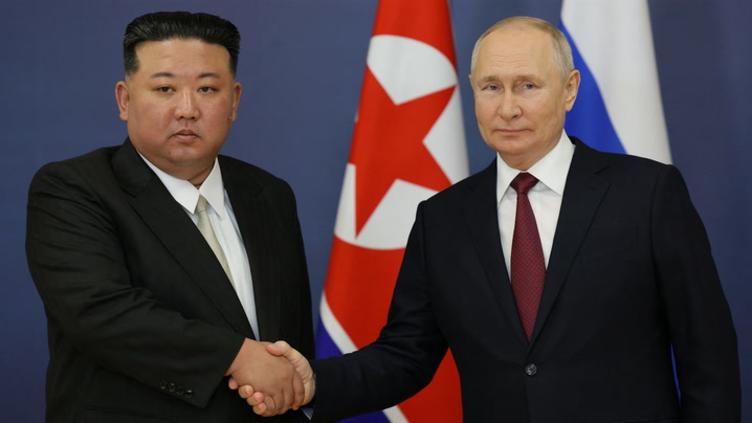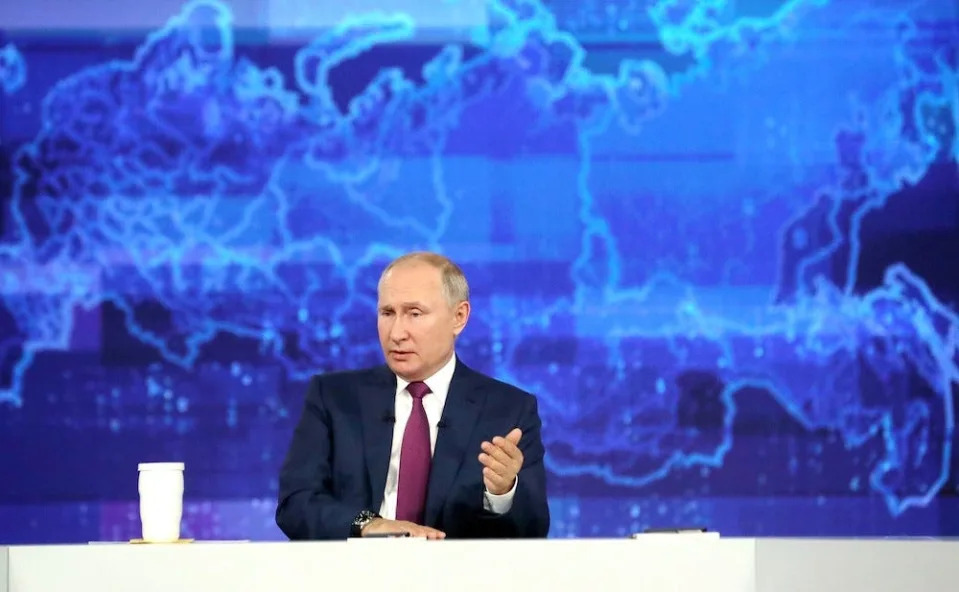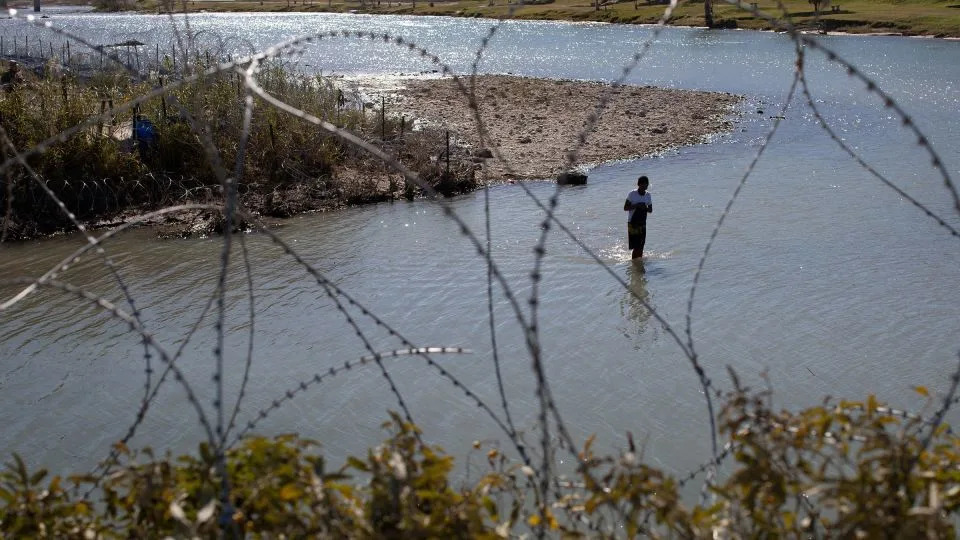The New York Times
Russia’s New Threats to Exiles: Seized Assets and Forced Returns
Anton Troianovski – February 1, 2024

In Bangkok this week, members of an anti-war Russian-language rock group were fighting deportation to Russia, detained in what supporters described as a cramped, hot, 80-person immigration holding cell.
On Wednesday in Moscow, the lower house of Parliament passed a law that will allow the Russian government to seize the property of Russians living abroad who, in the words of the legislature’s chair, “besmirch our country.”
The two developments, though thousands of miles apart, reflected the same grim calculus by the Kremlin: Using new legislation and apparent diplomatic pressure on other countries, it is turning the screws on Russia’s sprawling anti-war diaspora.
“Historic Russia has risen up,” President Vladimir Putin said at a meeting with backers of his presidential campaign on Wednesday, reprising his contention that the time has come to cleanse Russian society of pro-Western elements. “All this scum that’s always present in any society is being slowly, slowly washed away.”
Under the law, any Russian, even those in exile, found to be engaged in “crimes against national security” — including criticizing the invasion of Ukraine — could have their assets confiscated. Putin is expected to sign the law, though it is not yet clear how widely or aggressively the Kremlin plans to use it.
But the law’s quick passage — it sailed through the rubber-stamp State Duma unanimously — is another signal that the Kremlin, having stamped out dissent at home, is increasingly turning its attention to criticism from abroad. Hundreds of thousands of Russians fled after the war began, including many celebrities who can still reach their fans through platforms like YouTube, which remains accessible inside Russia.
Among the first to feel this increasing pressure are popular performers who have drawn large audiences in places popular with Russian émigrés like Dubai, United Arab Emirates, and Southeast Asia. In recent weeks, Russian anti-war celebrities have accused Thailand and Indonesia of bending to Russian pressure to cancel their shows, while an anti-war rapper found himself banned from reentering the United Arab Emirates, his adopted home.
The most dramatic case unfolded after members of the rock group Bi-2, originally from Belarus and one of Russia’s most popular bands, were arrested in Thailand last week for an immigration violation. Their supporters said Russian officials spent days pushing Thailand to deport some of them to Russia, where the musicians could have faced prosecution for criticizing the war.
By Wednesday, the rockers had escaped that fate thanks to the intervention of Israeli and Australian diplomats, who arranged for all seven band members to be deported to Israel, according to the group’s lawyer, who requested anonymity for security reasons. (Four are citizens of Israel, and one of Australia.)
The extent of the Kremlin’s efforts to get the rockers sent to Russia was not clear, but on Tuesday, the group said in a statement that Thai authorities had canceled an earlier plan to deport some of them to Israel after Russian diplomats visited the immigration center where they were being held.
Analysts and human rights advocates consider the case a stark demonstration of the Kremlin’s increasingly aggressive efforts to punish Russians speaking out against Putin abroad — especially when they do so in non-Western countries that are interested in maintaining good relations with Moscow.
“This is a special operation,” said Dmitry Gudkov, an exiled Russian opposition politician who is close to Bi-2, referring to what he described as Russia’s efforts to get the band members sent to Russia. “Their task is to grab someone big outside the country to show that they can grab anyone, anywhere.”
The rock group’s brooding hits are part of the soundtrack of the early Putin era, and in later years the group was rubbing shoulders with the Russian elite at marquee events — performing, for example, at Putin’s annual economic conference in St. Petersburg in 2019. But by last year, Bi-2’s lead singer, Igor Bortnik, was writing that Putin’s Russia evoked “only disgust and squeamishness.”
Russia’s Foreign Ministry denied interfering in the Bi-2 case in Thailand, but it referred to the band members soon after their detention as “sponsors of terrorism.” A Russian lawmaker, Andrei Lugovoi, said the country was awaiting Bi-2’s deportation “with open arms” and predicted: “Soon they’ll be playing and singing on spoons and metal plates, tap dancing in front of their cellmates.”
(Lugovoi is no stranger to Russian intervention abroad, having been charged by Britain in 2007 with poisoning a Putin critic in London.)
Thailand, which has stuck to a largely neutral stance on the war in Ukraine and is a prime destination for Russian tourists, said it was following established procedure. Asked by a reporter on Wednesday about the potential deportation to Russia of Bi-2 band members, the country’s foreign minister, Parnpree Bahiddha-Nukara, said that if they are found to have “committed illegal acts,” then Thailand “has to follow the process.”
The band released a statement from its concert organizer, VPI Event, acknowledging that it had failed to obtain the right visas for the band’s Jan. 24 show on the Thai island of Phuket. But VPI asserted that Thai authorities’ decision to arrest the performers — rather than sanction the concert organizers — was unusually harsh.
“We are making every effort to free the performers, but we are facing unprecedented pressure at every stage,” the company’s statement said while the musicians were still behind bars, adding that shows in Thailand by two other Russian anti-war performers had been canceled in recent weeks. “The campaign to cancel concerts under pressure from the Russian Consulate began in December.”
Some pro-Kremlin figures have started praising Russia’s Ministry of Foreign Affairs for getting more aggressive in putting pressure on anti-war Russians abroad.
“The MFA has really gotten to work in this regard,” Sergei Markov, a pro-Kremlin political analyst who appears frequently on Russian state television, said in a phone interview. Russian diplomats, he added, have been “actively informing” foreign governments in recent months about Russians who have “gone over to the enemy’s side.”
Alisher Morgenshtern, a rapper who had criticized the war and moved to Dubai, said last Friday that the United Arab Emirates had banned him from reentering the country. Ruslan Bely, an anti-war comedian, had two shows in Thailand canceled in January.
Another Russian comedian who opposes the war, Maksim Galkin, last week announced a show in Bali, Indonesia, days after Russian state media reported that his two planned shows in Thailand had been canceled.
But last weekend, Galkin told his 9 million Instagram followers that the Bali show, too, was canceled. Indonesian authorities, he wrote, had turned him away at the border and told him they were doing so at the request of the Russian government.
“It’s funny,” Galkin wrote, that the Russian state was expending so much effort on “the maniacal persecution of dissenting artists abroad.”
The head of the Bali regional office of Indonesia’s Ministry of Law and Human Rights, Romi Yudianto, said he was not familiar with Galkin’s case but that Indonesia “has its own sovereignty” and the right to reject unwanted visitors.
But Markov described the pressure on anti-war performers, as well as the new law allowing the confiscation of the property of Russians criticizing the war, as part and parcel of the same government effort.
“This is a message to those who are against Putin,” but aren’t sure how loudly to voice their disapproval, Markov said. It is a reminder to them, he said, that if they do speak up, even outside Russia, “don’t think that you’ll be fine.”














